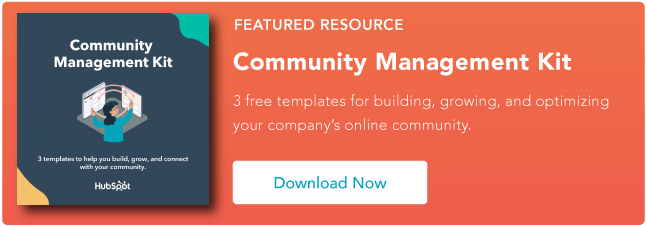Community Management Challenges and How to Overcome Them [Expert Tips]
- July 15, 2024
- Knowledge Base
- 0 Comments

A few years ago, I had to manage a Facebook community for a TV station I was working for as a digital journalist. It was a completely new experience, and there were definitely times I stumbled.
Community management challenges are real and can be hard to navigate if you’re new to the field.
Fortunately, I gathered valuable information from experts, including a fellow HubSpotter, so you can be the best community manager you can be and avoid some of my blunders.
If you‘re an organization looking for a community manager, these challenges and their solutions will help you understand the skills to look for when hiring one. Let’s dive in!
Top 8 Community Management Challenges
Here are several community management challenges and how the experts overcome them.
1. Community managers need to be good at many things.
It takes a lot to build and manage a community around a business, so an excellent community manager will need to have a diverse set of skills.
I spoke about this with Hubspot‘s principal marketing of community (and fellow ’Erica’), Erica Finley.
“Community managers often mediate community conflicts and may be required to draft crisis communications,” Finley says. “They must be curious and adept at conducting research online and via people-centric methods like focus groups.”
And community managers aren’t just managers.
“They are content creators who may be called to create entire calendars based on a specific persona or theme,” she says. “They are public speakers who often serve as emcees and facilitators for community events.”
If you want to become a community manager, consider diversifying your skills. Some valuable skills to possess would be writing and public speaking. You should also be an adept researcher, content creator, and social media user.

2. Some leadership teams won‘t ’get’ what you do.
Community isn’t new, and 86% of social media marketers believe having an active community is critical to a brand’s success. However, community management is pretty new to marketing and less strictly defined in business settings versus sales or digital marketing.
As a result, community managers sometimes encounter marketing leaders who need help understanding their jobs or the value of community management.
“Community pros often have to work harder to prove their value and contribution to the bottom line and should work with other internal teams to illustrate how they amplify their efforts,” Finley explains.
So, track your work and pay close attention to metrics, such as the number of people who visited your company’s website after a community page post or the profits that followed a community management initiative or event.
And, like Finley says, work closely with other teams and get them on board with your vision so you can better illustrate your value.
3. Scaling is hard.
Finley explains, “More often than not, community teams are small, and sometimes, they’re a team of one. As your community grows, it becomes increasingly difficult to respond to each message, nurture your members, think proactively about your roadmap, and report back on your success.”
I can relate to this sentiment as a content creator who spent a few years building my platform on YouTube and social media.
It was much easier to foster community with my audience when it was just a handful of people. However, my community eventually grew to thousands of followers across my platforms, and it became harder to nurture my audience and connect with them by replying to comments, liking their posts, or responding to messages.
“Look for helpers in the community that can be your eyes and ears when you’re not around, and lean into automating tasks that don’t require a human touch,” she says.
For example, consider Reddit moderators. Reddit moderators are users who volunteer to monitor subreddits, enforce rules that keep members safe, and ensure the community is peaceful and user-friendly.
Most Reddit communities have at least two to three moderators and will get more as members grow. So, consider tapping into your audience and relying on moderators for your online platforms.

4. Burnout is real.
Growing and maintaining a thriving community for an organization can be rewarding and draining, especially when you’re building a community in digital spaces like social media.
As I mentioned earlier, I helped moderate a Facebook community page for the station I worked for. Since the page was easily accessible from my phone, I constantly checked it and flagged issues even when I was supposed to be off the clock.
To no one’s surprise but my own, I found myself getting burnt out from constantly moderating, and it became hard to leave the stress of monitoring the group at the office.
“Burnout is real in such a people-centric role,” Finley says. “Community professionals should set proper boundaries and avoid an ‘always on’ approach to their roles.”
5. Creating an engaging community for a start-up has its hurdles.
Fostering community for a start-up or smaller company often means you‘re building community from the ground up, and that can be difficult because you don’t have many resources or metrics to go off.
You’re also laying the groundwork for future community managers who may join your organization.
But there are solutions, according to Harshil Boparai, Community Manager at The Alliance.
“Understanding member’s demographics and preferences is paramount—whether they seek career-centric insights, industry updates, networking opportunities, or other content,” she says. “So initiating dialogue during onboarding and establishing a Customer Advisory Board could help align these community objectives.”
6. It can be challenging to keep community members engaged and active.
“I would say this is probably a challenge for most community managers, and always a big goal to have good engagement,” says Emma Buitendag, Community Manager at The Alliance. Even with larger communities, keeping the engagement up can still be challenging.”
Buitendag says managers should stay focused with increased numbers of community members. You’ll need to keep the momentum going.
“You’ll want to regularly post engaging content, host events like webinars and in-person meetups, and constantly encourage discussions,” she says. “One would think that the bigger the community, the higher the engagement, but you still need to work hard to keep the engagement going, regardless of the size.”
7. Community managers have to know how to handle conflict.
Of course, no community is without its conflicts, and community managers must know how to handle them in a way that reflects positively on their organization.
“So, set out clear community guidelines,” Emma Buitendag says. “It’s very helpful to direct people’s attention back to the guidelines if they are breaking the rules. It’s also important that the rules are written down and clear so there is little room for confusion.”
Buiendah also suggests moderating discussions and intervening diplomatically and privately should conflict arise.
“Don’t try to reason with a member on an open platform,” she says. “I always make sure to privately message the person and resolve the issue between us.”
8. The way consumers communicate is constantly evolving.
There was a time when consumers could only reach a company or organization via phone or email. Now, consumers can reach out via social media, direct messages, text, and more.
“The processes involved in community management are constantly changing and evolving, so one key solution is always to be flexible and open to change,” Alliance Community Manager Millie McCaughrean says. “Feedback from members and internal colleagues regularly is paramount to keeping on top of the changes and adapting in the best way possible.”
So consider hosting focus groups and pay close attention to how your audience speaks of your company and how they communicate.
There are no easy jobs in marketing, and that includes community management. The field has its challenges, but they‘re nothing you can’t overcome with the right tips and tricks.
![Download Now: 3 Community Management Templates [Free Kit]](https://no-cache.hubspot.com/cta/default/53/866a5201-b39e-4edb-9e7f-65c0d98a9ea0.png)




